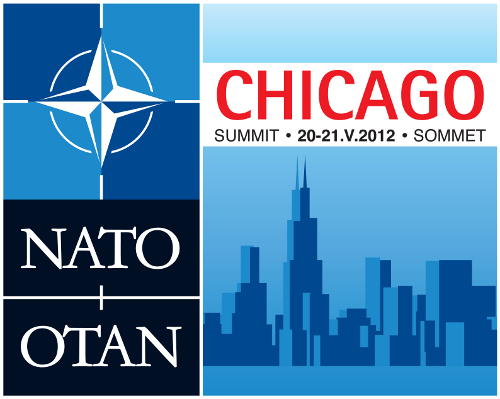
NATO’s 28 members and some dozen partners will convene Sunday at a heads of government, heads of state summit in Chicago, US President Barack Obama’s hometown.
Such summits have been held roughly every two years. The previous one took place in Lisbon, Portugal, in November 2010 where a new “strategic concept” was approved redefining NATO’s purposes for the 21st century with specific challenges and dangers of a post Cold War world two decades on.
The United States last hosted a summit in 1999, commemorating NATO’s 50th anniversary as an alliance. That summit met amid NATO’s first war being waged over Kosovo and the bombing campaign to force Serbian strong man Slobodan Milosevic to cease the killing of ethnic Kosovars and the impeachment of US President Bill Clinton.
The 2012 summit will lack that drama.
For most people, NATO isn’t a term used in the daily lexicon. It occasionally appears in the press, last year over the campaign that successfully removed Moammar Gadhafi as Libya’s ruler and in the persistent conflict in Afghanistan. But aside from several rooms full of experts and literati, Americans are far better acquainted with movie stars, celebrities and television programs than the most successful military alliance in history.
None of this is necessarily bad but public indifference does shift the balance between NATO as relevant or as a relic to the right. With the Soviet Union in its grave for more than a score of years and public opinion in the United States and Europe souring over the Afghan war, absent a clear and present danger, the obvious rationale for the alliance must be largely taken on faith and as an insurance policy against future threats provided the price tag doesn’t yield sticker shock.
The themes of this summit are Afghanistan and the planned phase down of NATO forces to be completed by the end of 2014; maintaining defense capability, i.e. military forces, in an “age (politely described as) of austerity,” meaning no money; and “partnerships” to provide global reach.
Yet, the summit takes place in the dark and thickening shadows of economic crisis in Europe extending across the Atlantic; a perilous situation in Afghanistan with ample critics of the strategy and viability of negotiations with the Taliban adversary and the inherent weakness and corruption of the Kabul government to assume full responsibility for the future security and stability of the country; and the US presidential elections in which Chicago almost certainly will be a showcase for pitching Obama as commander in chief.
The presence of the new French President Francois Hollande and uncertainty over Paris’ commitment to stay the course in Afghanistan and the absence of the new Russian President Vladimir Putin will complicate the summit and its expectations.
At this writing, Pakistan has finally received an invitation. Without Pakistan, any solution to Afghanistan would be incomplete. However, there are downsides. Without substantive agreements, the peace process will be harmed. And, regardless, Pakistan’s unprecedented anti-Americanism will be magnified, distorted and directed even more viciously against President Asif Zardari who will be portrayed as yielding to Washington and its despised policies.
More importantly, the alliance’s main business is unfinished — fashioning a credible message for its politicians and publics as to why NATO remains relevant to the security of its members and partners in the 21st century.
The current argument, sadly, is circular: We need NATO or NATO matters more because we need it more or because it matters more. That is an article of faith and a belief. That argument isn’t sufficient to convince largely indifferent or disinterested publics, absent palpable threats, of the need to sustain NATO for the indefinite future.
One option is for NATO to consider a name change for the long term. It is ironic and interesting that of NATO’s 28 members, only Canada, Norway, Iceland (with no military) and the northern tips of Britain and the United States touch on the North Atlantic. The southwest of France, Spain and Portugal border on the South Atlantic and the remaining 20 have no direct access to the Atlantic except through other routes.
So perhaps NATO could become the Trans-Atlantic Alliance reflecting a broader geostrategic rather than military pact. And since Atlantic would remain part of the name, what about potential partners on this side of that ocean to the south?
That Japan, Australian, New Zealand, Singapore and other partners in the Pacific have relationships with NATO, does it not make sense to reconsider expanding the nature of the partnerships programs? The answer is yes. However, that won’t happen soon.
NATO, no matter its name, is crucial to the security and stability of its members. If not now, sometime soon and before the next summit, that case must be made. Otherwise, NATO risks becoming a relic, no longer relevant to the demands of the 21st century.
Harlan Ullman is senior advisor at the Atlantic Council, and chairman of the Killowen Group that advises leaders of government and business. This article was syndicated by UPI, and is part of a series of New Atlanticist pieces on NATO’s 2012 Chicago Summit.
Image: NATO-Chicago-Summit-Logo.jpg
